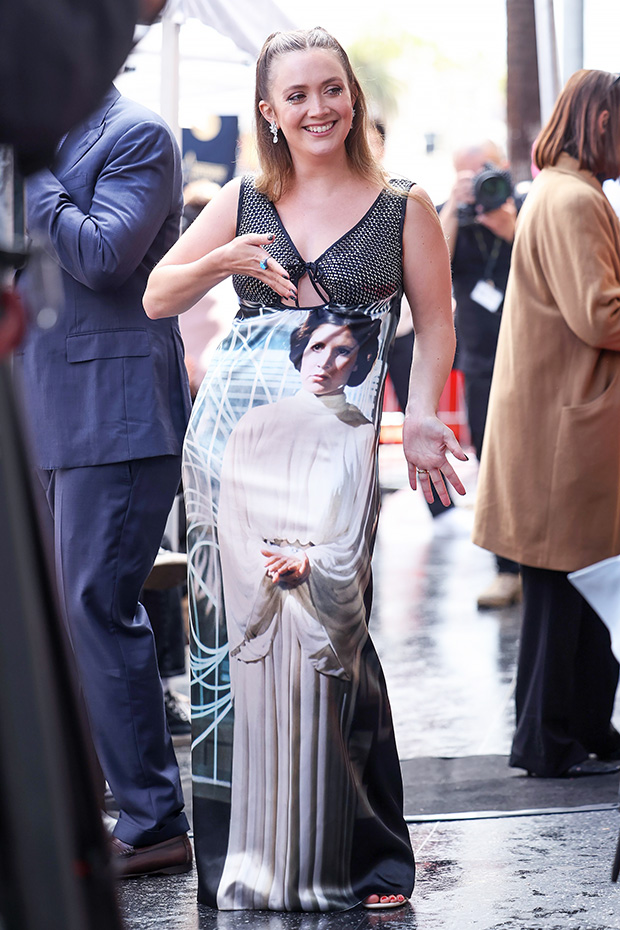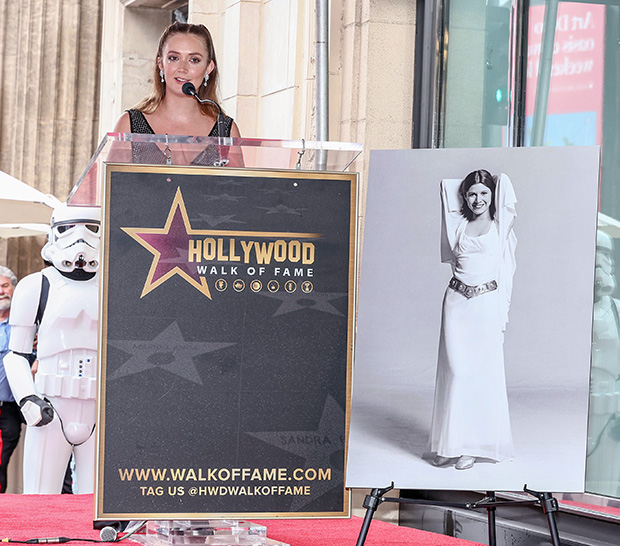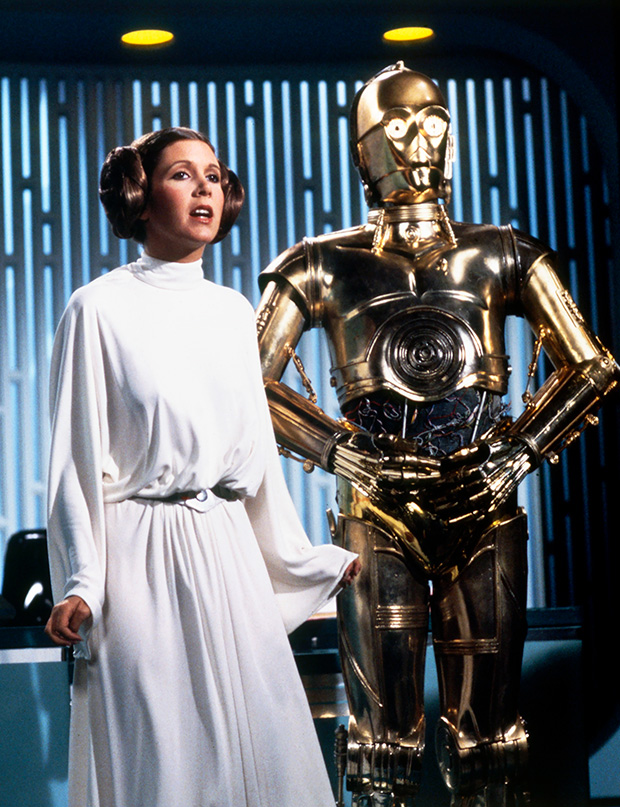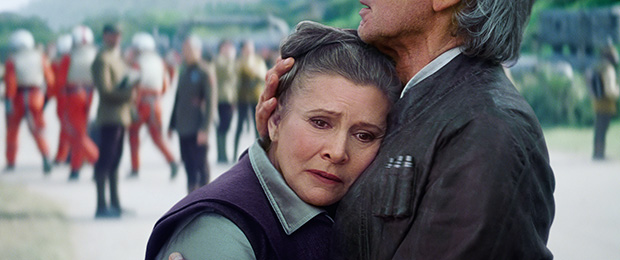
With May 4 christened Star Wars Day – “May the Fourth” is similar to “May the Force be with you” – there was no time better than Thursday to give Carrie Fisher a spot in the galaxy of stars that is the Hollywood Walk of Fame. Carrie, who passed away in 2016 at age 60, was instrumental in making Star Wars a cultural phenomenon with her portrayal of Princess Leia in the original movie trilogy. Carrie’s daughter, Billie Lourd, accepted the posthumous honor for her mother. Billie, 30, wore a dress bearing the image of her mother as Princess Leia as she accepted the honor.

Mark Hamill, the man who brought Luke Skywalker to life throughout the Star Wars franchise, attended the ceremony with Billie. The droids R2-D2 and C-3PO were also on hand to commemorate this momentous occasion. Billie thanked her “space uncle” for being at the ceremony.
Billie Lourd thanks her "space uncle" Mark Hamill at Carrie Fisher's Hollywood Walk of Fame ceremony. https://t.co/WQh9RdWx2f pic.twitter.com/amARrqSugG
— Variety (@Variety) May 4, 2023
Billie Lourd sprinkles Carrie Fisher's glitter on her newly unveiled star on the #HollywoodWalkOfFame. pic.twitter.com/7l6IYPEa8D
— Entertainment Tonight (@etnow) May 4, 2023
Carrie completes the trifecta, as her Star Wars costars, Harrison Ford and Mark Hamill, already have stars on the historic sidewalk. Carrie’s star is just a few feet away from Mark’s. Carrie’s mother, Debbie Reynolds – the actress best known for Singin’ in the Rain – has a star across the street from her, per NPR. Debbie passed away a day after her daughter did in 2016 at age 84.

Unfortunately, there was a little drama ahead of the star’s unveiling. Carrie’s sister, Joely Fisher, went on Instagram to say, Billie, “for some bizarre, misguided reason,” had not chosen to invite Carrie’s siblings to “this epic moment in our sister’s career… The fact that her only brother and two sisters were intentionally and deliberately excluded is deeply shocking.”
Billie, 30, issued a statement to The Hollywood Reporter about the rift. Billie apologized to “anyone reading this for feeling the need to defend myself publicly.” She then confirmed that she did not invite Joely, Todd Fisher, and Tricia Leigh Fisher to the ceremony, and “they know why.”
“Days after my mom died, her brother and her sister chose to process their grief publicly and capitalize on my mother’s death by doing multiple interviews and selling individual books for a lot of money, with my mom and my grandmother’s deaths as the subject. I found out they had done this through the press. They never consulted me or considered how this would affect our relationship,” Billie wrote in her statement. “Though I recognize they have every right to do whatever they choose, their actions were very hurtful to me at the most difficult time in my life. I chose to and still choose to deal with her loss in a much different way.”

Though Carrie is most known for her iconic portrayal of the sci-fi heroine, she had several high-profile roles in movies like The Blues Brothers, Shampoo, The ‘Burbs, and When Harry Met Sally. She was a lauded writer, having written a handful of semiautobiographical novels, from Postcards to the Edge to The Best Awful There Is. She also detailed her struggles with bipolar disorder and substance addiction in memoirs like 2008’s Wishful Drinking and The Princess Diarist.
In her post-Star Wars career, Carrie became known for her ability to “punch up” screenplays and was an in-demand script doctor. “I read mostly fiction, and then it went to obligation,” she told the Phoenix New Times when discussing this career. “I was asked to write a book based on an interview I did for Esquire. I was asked to write a nonfiction book, and I didn’t. [Laughs] I was asked to adapt that book, and then I started doing re-writes.”

Carrie reportedly provided some help on the Star Wars prequel trilogy, per SlashFilm. She also worked on Hook, Sister Act, Made In America, Lethal Weapon 3, So I Married an Axe Murder, The Mirror Has Two Faces, The Out-of-Towners, The Wedding Singer, Coyote Ugly, and Mr. and Mrs. Smith.
She ultimately quit the business when the bureaucracy got too much. ” It was a long, very lucrative episode of my life,” she told The AV Club. “But it’s complicated to do that. Now it’s all changed, actually. Now in order to get a rewrite job, you have to submit your notes for your ideas on how to fix the script. So they can get all the notes from all the different writers, keep the notes and not hire you. That’s free work, and that’s what I always call life-wasting events.”


